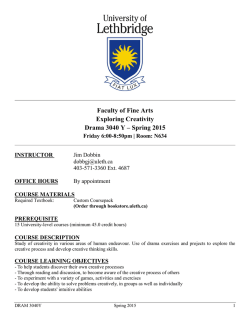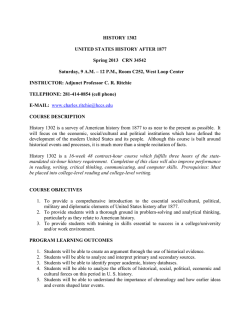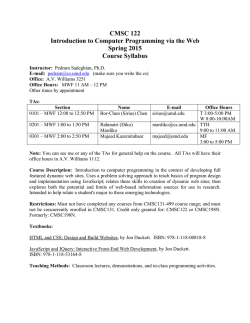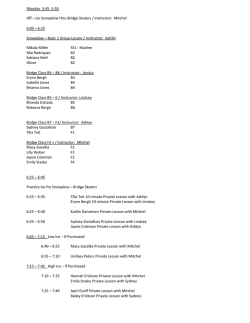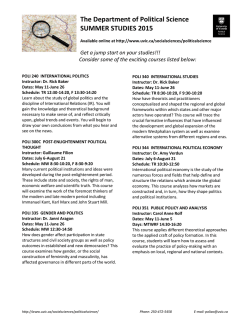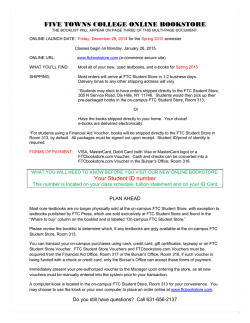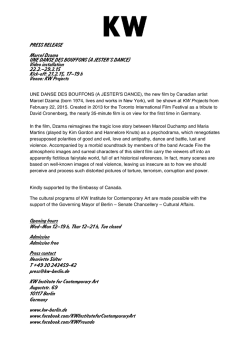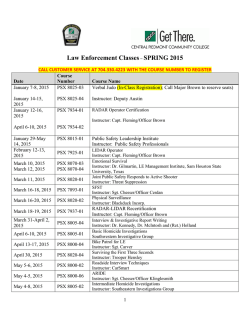
Spring 2015 Course Descriptions
COMMUNICATION DEPARTMENT COURSE DESCRIPTIONS SPRING 2015 COM 1000-001, 002, 003, 004, 005, 006 Survey of Communication Studies Process of communication; range of perspectives from which communication can be studied (from classical rhetoric to contemporary theory); the functions communication serves; and the forms of communication such as interpersonal, small group organizational, public address and mass media. Instructors: Arnold, Moore, O’Leary This course is a prerequisite needed to declare COM major. COM 1100- 001, 002, 003, 004, 005, 006, 100 Public Speaking Principles of communication related to speech composition and delivery; finding, analyzing, organizing and presenting material in ways appropriate to and effective with listeners. In this course students will gain an under- standing of the rhetorical processes associated with public communication and will develop the skills necessary to present ideas to culturally-diverse audiences that will make a difference in their communities, careers, and personal lives. Instructors: Arnold, DeMarco, Mackey-Kallis, Weaver, Staff This course is a prerequisite needed to declare COM major COM 1101-001, 002, 003,004, 005,100 Business & Professional Communication The goal of this course is to prepare students to understand and develop useful communication strategies and skills to establish and maintain productive relationships in a variety of business and professional settings. This is a hybrid course that combines traditional public speaking, small group and organizational communication and is not intended for Communication department majors. Instructors: Fleckenstein, Gasser, McCloskey, Staff COM 1300-001,002,003 Film Analysis This course focuses on the analysis of contemporary and historically important films, employing a variety of analytical models. Anyone who is a film buff or wants to learn about how films are constructed would benefit, as would students interested in polishing their writing skills and/or learning about the sociological impact of the cinema. The course promotes the development of visual analysis skills and an awareness of the cultural, economic and social forces of the period in which the film was made. Instructor: Chour, O’Leary Requirements Filled: Fine Arts COM 2200-001 Theories of Rhetoric This course is an introduction to the central theories of rhetoric. Rhetorical theories can be understood as attempts to reflect upon and understand the process by which community is generated and maintained by the strategic use of symbols. In addition to its principal focus on the theories and history of rhetoric, this course serves as an entry point to the culture of critical inquiry and argument that constitutes rhetorical studies. Instructor: Murray 1 COM 2240-001 Theories of Performance Studies Performance is explored as a fundamental component of human communication. Students experience the theories and practice of performance in multiple contexts, including everyday life (e.g., performing a ‘date’, performing whiteness), storytelling (e.g., personal narrative, performance of literature, folklore and oral traditions), theatre and other performance spaces (e.g., performance art), and rhetorical/critical spaces (performance for social change, performance ethnography). Prior performance experience is welcome but not necessary. Instructor: MacDonald Requirements Filled: Fine Arts COM 2280-001 Theories of Persuasion Presents the theoretical processes by which communication influences the attitudes, beliefs, and behaviors of message recipients. Both rhetorical and social scientific approaches to persuasion are examined. Application is made to the areas of advertising, public relations, politics, and health communication. Instructor: Woodard COM 2300-001 Theories of Mass Communication Traces the evolution and structure of core theoretical approaches to understanding mass communication phenomena. Both behavioral and critical approaches and their related research traditions are explored. Instructors: Shyles, Xu COM 2340 -100 Theories of Visual Communication & Culture The course deconstructs what we think we know about what we see to demonstrate that what we see is influenced by the culture in which we live and the meanings we give to our visual universe. Learning and employing the theoretical lenses of semiotics and visual cultural studies, visual rhetoric, and feminist psychoanalysis, we will examine images in media, brands, advertising, and our everyday lives to understand the visual language used, the “commonsensical” meanings given and understood, and what they reveal about our culture. Instructor: Coonfield COM 2400–001 Theories of Interpersonal Communication Survey of concepts and theories in interpersonal communication. Focuses on dyadic interaction and relationships as created, maintained and modified through verbal and nonverbal behavior. Instructor: Moore 2 COM 2440-001 Theories of Organizational Communication Explores the social construction of human relationships in organizations, both healthy and unhealthy; examines how and why organizations develop policies and procedures that both encourage and yet constrain creativity and autonomy in employees. Examines organizations through the eyes of the researcher who wants to understand, but not control or predict, the dynamics that are unfolding. This will be accomplished through careful, critical reading and synthesizing of some of the voluminous literature on how group life is accomplished in organizations. Instructor: Hall COM 3201-001 Rhetoric and Social Justice In this course, we will explore and critically examine discourses on social justice and human rights through an integration of rhetorical theory and criticism. Of central importance to ensuring social justice and human rights are those communicative/rhetorical acts that disrupt, provoke, encourage, and help to mobilize. From public debates to mediated dialogues, from embodied politics and performances of resistance to more extreme acts of violence and terrorism, the rhetorical scholar has a responsibility to study how those practices enrich (or hinder) social justice and participation in public life as well as determine their effectiveness, ineffectiveness and ethical dimensions. As a student in this course, you will learn how to identify, analyze, invent, augment, and/or challenge the complex array of discourses on social justice and human rights. You will be introduced to the theoretical foundations of rhetoric and social justice and the various communicative techniques and strategies common to those struggling to advance human rights. In addition, you will gain exposure to an array of contemporary and historical debates that continue to shape popular and political culture. Instructor: Murray Prerequisites: COM 2200 or 2280 or 2340 or 2240 or 2400 Requirements Filled: Peace and Justice Attribute COM 3207-100 African American Rhetoric: Strategies, Style, and Social Construction African American Rhetoric tells a story of the African American experience in the United States. This story will be told through a critical examination of a variety of rhetorical artifacts. Starting with the American Revolution, we will look at speeches, essays and poems written about the black experience in America. As we move into the contemporary American experience we will add media artifacts such as movies, music, and television to our list for critical examination. The primary objective of the course is to develop a comprehensive understanding of the symbols used to rhetorically construct and reconstruct the African Time: W 6:10-8:50pm Instructor: Nance Requirements Filled: Diversity 1, Peace and Justice Attribute Prerequisites: COM 2200 or COM 2240 or COM 2280 3 COM 3301-001 Introduction to Film & Video Production This hands-on workshop will introduce students to the fundamentals of TV production. Students are expected to produce individually and in small groups, broadcast video projects combining all fundamentals learned in class - terminology, script writing, single and multi-camera operation, lighting, audio capture, computer based video editing and effects, and live studio production. The final project will prove how well each student has mastered the above components of video production. Instructor: Lewis Prerequisites: COM 2280 or COM 2300 or COM 2340 COM 3302 – 001 Advanced Film and Video Production Visual aspects of location single camera video production, audio acquisition, lighting, post production support, video editing and digital effects and finished distribution. Each student will work as producer, director, camera operator, editor and writer to show a finished Documentary, Feature News Story or Originally Scripted Drama or Comedy. Helps students understand the world of film and video funding, production and distribution. Instructor: Lewis Prerequisites: COM 3301 COM 3303-001 Screenwriting The purpose of this course is to prepare you to write two short screenplays by introducing you to the building blocks of cinematic storytelling. Students are expected to develop a solid foundation in screenwriting format, three act dramatic structure, character conception and development, the difference between plot and story, and the best way to put all of this information to use in the actual writing of treatments and screenplays. Although the three act model we will use in this class is not the only, or perhaps the best, way to write screenplays, it is standard in the industry and must be mastered by beginning screenwriters. By the end of the semester you will have written two treatments for short films and two screenplays in master scenes form. Part of the goal of this course is to gain an understanding of storytelling that will be applicable to various media. Most class sessions will be a combination of lecture, film viewing, and writing exercises. You are expected to work independently and in collaboration with other students. Instructor: O’Leary Requirements Filled: Fine Arts Prerequisites: COM 1300 and COM 2240 or 2280 or 2300 or 2340 COM 3304-001 Documentary Theory and Practice This course will combine an academic study of documentary films with practical knowledge of the creation and marketing of documentary films. Students will examine the documentary as an art form, a social protest, and a reflection of culture and society. In addition, man aspects of the practice of documentary filmmaking will be studied, especially as they are related to The Center for Social Justice Film and The Social Justice Documentary Film Course. These aspects include finding and researching future topics for the Social Documentary course, and doing public relations work for past films produced in the course. Students will also learn film production techniques and strategies, including story structure, camerawork and editing skills. Instructor: Lewis Prerequisites: COM 3301 4 COM 3321-001 Interactive Media Design I Study of the principles of creating effective communication for the World Wide Web. Explores basic web design techniques with emphasis on designing and integrating diverse media elements. Focus on the creation and manipulation of text, graphics, audio and video for the Web. Basic principles of visual and graphic design are also covered. *Course was previously cataloged as COM 3307. If you have already taken Multimedia Production, this course will be a duplicate. Please do not register for COM 3321 if this is the case. Instructor: Mafodda Prerequisites: COM 2280 or 2300 or 2340 COM 3322-001 Interactive Media Design II An advanced exploration of Interactive Media Arts & Design for the Web and beyond, with a special focus on developing and consuming content on mobile devices. Students will be issued an Apple iPad for the duration of the semester and will create a digital interactive mobile app for it. *Course was previously cataloged as COM 3390: Media Design for Mobile Devices. Students who have taken this course are eligible to re-register for COM 3322 (new and different portfolio material will be an outcome of the class), but there will be some duplication of the academic component. Instructor: Mafodda Prerequisite: COM 3321 or COM 3307 COM 3341 – Gender and Film This course examines to the role of cinema in the cultural production of gender in contemporary societies. Students analyze gender in a variety of contemporary American films with a special emphasis on the way film structure and content rhetorically constructs masculinities and femininities and the ideological functions and implications of these constructions for audiences and culture. This analysis of specific films is grounded in course readings taken from primary sources in feminism film theory and criticism, rhetorical film theory and criticism, gender theory and media studies. Students will have the opportunity to propose and explore analytic, creative, and/or theoretical projects within the purview of the course theme. Instructor: Mackey-Kallis Prerequisites: Any COM 2000 level course Requirements Filled: Fine Arts, Diversity 2 COM 3343- 001 Contemporary Cinema Exploring contemporary films of renowned film directors and analyzing how they stylistically and thematically address and reflect various themes in national and global contexts. Themes of family, class, gender, politics, identity, and relations as addressed in specifically selected films that have left a significant mark on the landscape of Contemporary cinema will be studied. Cinema will be examined as a product of the societies it aims to influence. Instructor: Chour Prerequisites: Any COM 2000 level course Requirements Filled: Fine Arts 5 COM 3352 – 001 Media and Technology Surveys the development of communication technologies from the printing press through the internet and beyond. Technological development will be used as a way to explore critical issues about economic development, the nature of meaning, technological determinism and globalization. Instructor: Coonfield Prerequisites: COM 2280, COM 2300, COM 2340, or COM 2200 COM 3353-001 Media and Politics This course introduces class members to the field of political communication in both theory and practice in the mass media setting. The objectives are: to learn how campaign organizations use media outlets to present candidates to voters; to examine how mediated political messages impact citizens; to explore how such messages influence political outcomes on both the federal and local levels; to explore how political messages shape national and international public opinion; and to study how current trends in media development may impact the democratic process and the future. Instructor: Shyles Prerequisites: COM 2200 or COM 2240 or COM 2280 or COM 2300 or COM 2340 COM 3360-001 Introduction to Journalism News is an integral part of our daily lives—from the “Eye-witness” reports on Channel 10 and the headlines of the New York Times to Internet news-sites and the tawdry tabloids awaiting us at the supermarket checkout. This course aims to provide a critical understanding of the role of journalism in modern society, combining theoretical perspectives on the making of news with insights from the journalists who produce it. Students will analyze research material on journalism, as well as examine newsmaking across platforms such as television and the Internet. While students will be introduced to foundational journalism practices, this course takes a more theoretical approach to journalism in order to provide the necessary background and context for more in-depth exposure to the practice of journalism in future courses. Instructor: Ksiazek Prerequisites: COM 2200 or COM 2280 or COM 2300 or COM 2340 COM 3365-001 Sports Journalism These days, sports journalism is so much more than good reporting. People blog, Tweet, Podcast, Update Facebook pages. Commentators deliver instant analysis of every detail, every day. Athletes’ lives off the field are more interesting than their play on it. And ESPN reigns supreme – or at least that’s what it wants us to think. Sports journalism is changing rapidly, and this course will show you what’s going on. You’ll learn how technology creates instantaneous news delivery. How talk radio, TV, the Internet and social media are taking over for newspapers and magazines. How athletes and teams are trying to control the message more than ever. You’ll write, argue, speak, research and present. You’ll use social media and the web. And you’ll do it with a 29-year veteran of the business. By the time this course is over, you’ll be ready for Pardon the Interruption – or at least understand why it’s so popular. More importantly, you’ll start thinking about what comes next – and how to take advantage of it. 6 Instructor: Bradley Prerequisites: COM 3360 COM 3390-001 Multimedia Journalism Journalism is no longer defined by a single medium. Newspapers have become digital news organizations with print, online and mobile editions. Broadcast journalists have Facebook pages and Twitter accounts. Journalists are writing for digital media, shooting video, blogging, creating podcasts, and using social media to distribute their content and engage users. This course explores journalism across media platforms. Students will learn to write for a variety of media, create integrated news packages, and maintain strong journalistic principles, techniques and ethics within and across these varied platforms. Instructor: Bradley Prerequisites: COM 3360 COM 3403-001 Intercultural Communication Today more than ever before in human history, you are likely to encounter persons from different cultural backgrounds in your work, neighborhood, and personal life. This course offers an introduction to the concepts associated with culture and communication. It combines both well-researched theories and everyday intercultural practice. It addresses mindful self-awareness/other-awareness issues, plus cognitive learning, affective experience, behavioral practice, and ethical reflections. Both cross-cultural (i.e., comparisons—such as how people in the United States communicate differently from people in Iran) and intercultural (i.e., communication between members—such as how people in the United States and Iran communicate when they interact with each other) communication will be examined. This class will emphasize a “process” approach to the study of communication between persons across cultures. Instructor: Wang Diversity 1; Diversity 3 COM 3442-001 Teambuilding and Small Group Communication Collaboration is an increasingly important part of life in various organizational contexts – corporations, non-profit organizations, educational institutions, civic organizations, religious institutions, etc. In this course, we will consider various theoretical approaches to collaboration, groups and teams within the communication field and will address topics such as power, leadership, decision-making, conflict, trust, diversity and virtual collaboration. Group exercises and assignments will provide us with practical opportunities to apply what we are learning and will illuminate our theoretical understandings. Instructor: Way Prerequisites: COM 2200 or 2280 or 2400 or 2440 7 COM 3460-001, 002 Public Relations This course provides a foundation for students interested in the field of public relations. It chronicles the development of the profession from its earliest beginnings to its role in modern management. The course also attempts to bridge the gap that exists between theory and practice. It achieves this by emphasizing the fundamental management perspective of the profession and the persuasive intent of message construction while highlighting the four essential skills required for success in the industry - research, writing, planning and problem solving. Instructor: Flanagan Prerequisites: COM 2200 or 2280 or 2300 or 2340 or 2400 or 2440 COM 3461-100 Advertising This introductory course in advertising provides students with an interest in advertising, public relations, organizational communication, and marketing communication, with a thorough understanding of the advertising structure. The course provides students with detailed information concerning the core skills required of advertising executives. Areas of study include the research process in advertising, the creative platform development and execution, the strategy involved in media planning and buying and the process of evaluating advertising effectiveness. Students gain hands-on experience in developing advertising executions and campaigns for a variety of products, services, individuals and ideas. Instructor: Tamney Prerequisites: COM 2200 or 2280 or 2300 or 2340 or 2400 or 2440 COM 3462-001 Public Relations Writing This course offers students the foundation for producing a variety of written public relations materials. The structure includes an overview of the journalistic style of writing along with extensive practice in writing fundamentals. Following the work on enhancing writing skills, students will develop a variety of pieces for their portfolios. Final class products include print news releases, position papers, feature stories, media advisories, media kit, and other related assignments. The course is strongly recommended for students interested in public relations, advertising, marketing, and organizational communication. Instructor: Flanagan Prerequisites: COM 3460 COM 3464-001,002,003 Public Relations Campaigns This course explores a variety of case studies in the field of public relations including examples in media relations, crisis communication and planning. Following the review of cases, student groups will be created and will spend the remainder of the semester developing a professional campaign for a client. The final project is a presentation of this overall public relations plan. Instructor: Cowen Prerequisite: COM 3462 8 COM 4001-001, 002, 003 Qualitative Research in Communication Review of basic principles of critical inquiry in the interpretive paradigm. Reading and designing qualitative research in communication through gathering and critically analyzing literature in the field and proposing an original study. Methods include ethnography and textual analysis. Instructors: Bowen, Crable, Way Restricted to COM Majors COM 4002-001,002,003 Quantitative Research in Communication Reading and designing research in communication through gathering and critically analyzing literature in the field and introduction of the chief methods used in communication studies. Instructors: Ksiazek, Woodard, Xu Restricted to COM Majors Requirements Filled: Writing Enriched COM 5050-001 Senior Project Ethnography & Communication This section of senior project explores various modes of ethnographic inquiry, from traditional ethnography, to performance ethnography, to autoethnography. We will begin with foundational readings concerning communication and culture and ways of doing ethnographic research and writing. Students will have the opportunity to conduct studies in a variety of cultural contexts for the purposes of using ethnographic methods to learn about self and other . Instructor: Rose Prerequisite: Either COM 1200 and (COM 4001 or COM 4002); OR COM 4001 and COM 4002 Required Course for Seniors COM 5050-002 Senior Project The Role of the Media in Shaping Attitudes, Beliefs &Values This section of Senior Project invites students to investigate the nature and context of media experiences. The specific focus of these investigations will center upon the role of the media in shaping attitudes, beliefs, and/or values. Methodological approaches that afford us the opportunity to witness the potential influence of the media will be privileged. Television as the dominant medium of our culture will also be privileged; however, students are welcome to explore other channels of mass communication as their research questions so warrant. Instructor: Woodard Prerequisite: Either COM 1200 and (COM 4001 or COM 4002); OR COM 4001 and COM 4002 Required Course for Seniors COM 5050-003 Senior Project Gender, Bodies, and Technology 9 This section will explore the embodied communication and performance of gender with, through, and represented via technology. From the technological manipulation of gendered bodies to differences in gendered technology use, mediated representations of gender and sexuality, social media wars and/or activism, and beyond, there are many questions to be asked about gender, bodies, and technology. We will develop research questions, and design qualitative studies (i.e., ethnography, interviewing, and/or textual analysis) to attempt to answer these questions. **ONLY Qualitative Methods will be used in this section; it is recommended for students who have taken COM 4001.** Instructor: MacDonald Prerequisite: Either COM 1200 and (COM 4001 or COM 4002); OR COM 4001 and COM 4002 Required Course for Seniors COM 5050-004 Senior Project "Xu’s section of Senior Project will be focused on media effects. The course welcomes students who are interested in areas of investigation exploring how various messages (e.g., news, commercials) delivered through media channels (e.g., print, TV, or social media) generate a range of cognitive, attitudinal, and behavioral effects among audiences. Quantitative research methods are preferred. Students who are interested in above topics but wish to conduct a qualitative research project should contact the instructor prior to registration." Instructor: Xu Prerequisite: Either COM 1200 and (COM 4001 or COM 4002); OR COM 4001 and COM 4002 Required Course for Seniors COM 5050-005 Senior Project This section invites students to adopt the lens of rhetorical/critical analysis in the examination of media discourses. Projects that adopt a feminist perspective are particularly encouraged; however other perspectives are also possible. Group projects will either take the form of the traditional academic essay or a documentary/video essay. If students choose the second option, there will still be a substantial set of written assignments to accompany the media production. Instructor: Mackey-Kallis Prerequisite: Either COM 1200 and (COM 4001 or COM 4002); OR COM 4001 and COM 4002 Required Course for Seniors COM 5050-006 Senior Project Theme: Analyzing Messages Class members will analyze the content and/or impact of selected public communication campaigns (PCCs). PCCs may include commercial or non-commercial efforts (including but not limited to public and private sectors, i.e., corporate, political, and non-profit). Examples include such topics as determining the effectiveness of no-smoking campaigns, the Army's recruitment efforts, political debates, new product roll-outs, and analysis of both successful and unsuccessful persuasive strategies. Instructor: Shyles Prerequisite: Either COM 1200 and (COM 4001 or COM 4002); OR COM 4001 and COM 4002 Required Course for Seniors 10 PERSONAL PROMOTION WORKSHOP SERIES An exciting offering from the Communication Department, this series of one-credit seminars gives students expert information and competitive advantages in many areas of self-promotion in communication. Perfect for preparing to pursue internships or professional employment, the courses are designed so they can be taken individually (one-credit each) or as a complete set (three credits). THESE COURSES ARE RESTRICTED TO COM MAJORS/MINORS; PERMISSION OF DEPARTMENT CHAIRPERSON REQUIRED. COM 5200-100 Professional Development Personal Promotion: Creating Powerhouse Promotional Pieces Are you professionally prepared and impressive on paper? Learn how to build the best communication industry resume for you. Develop cover letter strategies and a customized biography. Improve your promotional tools through industry insight and peer evaluation. Time: Friday, January 23, 2015, 5-9pm and Saturday, January 24, 2015, 9am-4pm. Instructor: Weaver COM 5200-101 Professional Development Personal Promotion: Building the “You” Brand What is unique about you? What skills and talents do you bring a potential employer in communication? Find out through personal brand statements, goal setting professional motivation and preliminary career planning. Time: Friday, February 6, 2015, 5-9pm and Saturday, February 7, 2015, 9-4pm. Instructor: Weaver COM 5200-103 Professional Development Personal Promotion: Landing a Job and Launching a Career How well do you (or will you) interview? Discover the best techniques to “bring it all together” and find success when searching for communication jobs and internships. Improve or build your portfolio through a comprehensive professional and peer review> Time: Friday, February 20, 2015, 5-9pm and Saturday, February 21, 2015 9-4pm. 11 Instructor: Cowen COM 5300 Topics in Intergroup Relations (IGR) The focus of IGR (Intergroup Relations) is on creating understanding relationships among people from different identity (e.g., social, economic, racial and ethnic) groups through communication skills of careful listening and meaningful dialogue. Topics vary by section. (One-credit courses) – Permission of Chairperson required. Students must complete application form at www.villanova.edu/igr. Three IGR courses can be used as Free Elective, Diversity 1. They do not have to be taken in the same semester. PLEASE CHECK THE MASTER SCHEDULE FOR SECTION NUMBERS. COM 5300- 100 Dialogue- Identity & Interfaith Tuesdays, 6-8pm Jan. 27; February 3, February 10, February 17, February 24, March 10, March 17. Instructors – Abugideiri; King COM 5300- 101 Dialogue-Race Mondays, 6-8pm January 26, Feb. 2, Feb, 9, Feb. 16, Feb. 23, March 9, March 16 Instructors – Jackson and Morris COM 5300-102 Dialogue - Gender Mondays, 6-8pm January 26, Feb. 2, Feb, 9, Feb. 16, Feb. 23, March 9, March 16 Instructors - Bowen and Sheridan COM 5300-103 Dialogue:Socioeconomic Status Mondays, 6-8:20pm January 26, Feb. 2, Feb, 9, Feb. 16, Feb. 23, March 9 Instructors: Brophy and Dwyer COM 5300-104 Dialogue: White Racial Identity Mondays, 6-9pm January 26, Feb. 2, Feb, 9, Feb. 16, Feb. 23 12 Instructors: Anthony and Malott COM 5300-105 Dialogue: Advanced Race Friday, 5-9pm March 20, 2015 Saturday, 9am-5pm, March 21, 2015 Instructors: Anthony and Hall Students must have taken the Race or White Racial Identity IGR Course. UNDERGRADUATE SUMMER 2015 SCHEDULE SESSION I May 27 - June 24, 2015 Course No. Course Title Instructor Days COM 1000-010 COM 1100-010 COM 2280-015 Survey of Communication Public Speaking Theories of Persuasion Arnold Shyles Woodard M-F 10:30am-12:20pm M-F 8:30-10:30am Distance Learning COM 2300-010 COM 2400-015 COM 3290-015 Intro to Mass Com Theories of Interpersonal TOP: Rhetoric of Conspiracy Theories Gender & Communication Public Relations Quantitative Research Directed Study Shyles Bowen Arnold M-F 10:30am-12:20pm Distance Learning Distance Learning Bowen Flanagan Woodard Hall Distance Learning Distance Learning M-F TBA COM 3406-015 COM 3460-015 COM 4002-010 COM 5100-010 Course No. COM 1000-020 COM 1300-020 COM 3360-025 COM 3390-025 Course Title Survey of Communication Film Analysis SESSION II June 26 - July 27, 2015 Instructor Days Weaver M-F Introduction to Journalism TOP: Media Audiences Time Time 8:30-10:20am Lewis Tues & Thurs Ksiazek Distance Learning Ksiazek Distance Learning 13 10:30am-12:20pm 6:00-9:50pm Course No. COM 1101-030 COM 5100-030 Course Title Business & Professional Com Directed Study SESSION III May 27 - July 27, 2015 Instructor Days O’Leary MW Hall TBA Time 6-8pm TBA Communication Courses Fulfilling Diversity Requirement COM 3207 COM 3403 COM 3341 COM 5300 African American Rhetoric (Div. 1) Intercultural Communication (Div. 1; Div. 3) Gender and Film (Div. 2) Topics in Intergroup Dialogue (IGR) (bundle three for Div. 1) Communication Courses Fulfilling Fine Arts Requirement COM 1300 COM 2240 COM 3303 COM 3341 COM 3343 Film Analysis Theories of Performance Studies Screenwriting Gender & Film Contemporary Cinema Communication Courses Fulfilling Peace & Justice Attribute COM 3201 COM 3207 COM 5300 Rhetoric and Social Justice African-American Rhetoric Topics in Intergroup Relations (IGR) (three courses) 14 Graduate Courses SPRING 2015 COM 8001-001 Qualitative Research Methods Qualitative approaches to communication research including phenomenology, ethnography, rhetorical criticism, and semiotic analysis. Emphasis on the performative turn in ethnography and alternative forms of ethnographic writing. Primary work consists of semester-long original study. With Departmental permission, this course can substitute for Senior Project. Instructor: MacDonald T 6:30-9:30pm COM 8009-001 Personal Promotion in Communication (one-credit seminar) This one-credit seminar gives graduate communication students useful information and competitive advantages in many areas of self-promotion in communication. The course is perfect for those preparing to pursue internships as well as initial or enhanced professional employment. The course will include the following components: Promoting Yourself on Paper; Building the “You” Brand; and Creating Your Career. Instructor: Cowen - Friday, January 16, 2015 – 5-9pm; Saturday, January 17, 2015 – 9-5pm. COM 8205-001 Intercultural Communication Historical and contemporary study of intercultural communication in interpersonal, organizational, and mass mediated contests. Topics: cultural identity, ethnocentrism, culture and language, culture and the body, intercultural conflict, intercultural communication competence, and cultural adaptation. Instructor: Wang W 6:30-9:30pm COM 8302-001 Advertising Research process in advertising, creative platform, development and execution, media planning and buying, evaluating, advertising effectiveness, new and non-traditional advertising, internet and webbased advertising, client management, and advertising in a socially conscious marketplace. Instructor Minoff M 6:30-9:30pm COM 8310-001 New Media Examines communication technology from the multiple perspectives of technology, markets and policy. 15 Instructor: Oswald R 6:30-9:30pm COM 8318-001 Developing Crisis Communication Materials Covers the essential strategies and tools needed for professional communicators to successfully prepare for and handle in-process organizational crises. Students will learn proven techniques for creating crisis statements, preparing talking points for media interviews, writing briefs for management and legal counsel, developing a range of message vehicles to communicate effectively in the post-crisis environment. Agency teams formed to strategically manage crises through developed materials. Instructor: Cowen Friday, January 30, 2015, 5-9pm; Saturday, January 31, 2015, 9-5pm. GRADUATE COURSES SUMMER 2015 COM 8203 Organizational Research and Consulting Course is designed to prepare students to understand and analyze organizations as researchers and to prepare them to conduct consulting interventions in organizations as communication consultants. Instructor: Hall R 6:30-9:30pm COM 8300-035 Public Relations Writing Journalistic style of writing, media ethics, targeting audiences, practice in fundamentals, media relations techniques; create portfolio writing samples, e.g., industry standard news releases, pitch letters and features, Q&A documents, crisis statements and positions papers. Instructor: Flanagan DISTANCE LEARNING COURSE COM 8306-020 Media Production Provides an overview of the video production experience for those who want to include media production in business, advocacy, research and education. Instructor: Lewis MR 6-9pm COM 8320-030 Digital Media Design This course is designed to provide a broad-based overview of the Media arts & Design industry, focusing on the research, strategies and methods that go into designing and preparing media for consumption via a variety of delivery methods (including traditional mass media, online, and mobile devices). Students will gain a theoretical understanding of and practical experience with: digital photography & videography, web design & development, and multimedia production. Additional, indepth, hands-on experience is offered through a series of 1-credit workshops. Instructor: Mafodda T 6:30-9:30pm 16 17
© Copyright 2026
